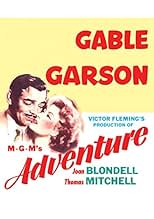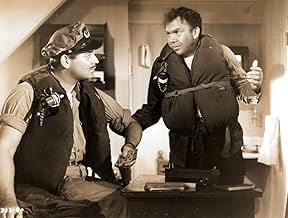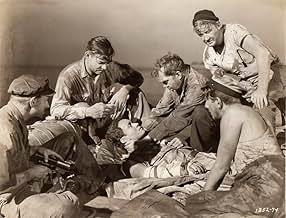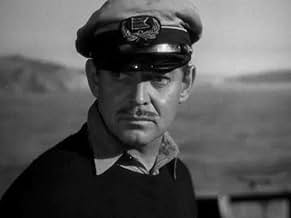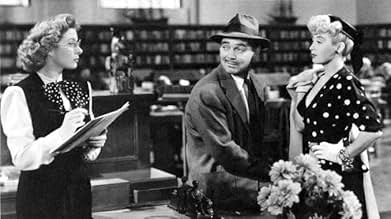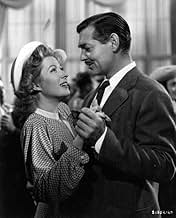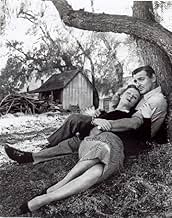ÉVALUATION IMDb
6,1/10
1,3 k
MA NOTE
Un drame sombre et romantique sur un marin marchand tapageur et un bibliothécaire sophistiqué qui se heurtent à leur style de vie et à leurs valeurs, puis tombent en amour.Un drame sombre et romantique sur un marin marchand tapageur et un bibliothécaire sophistiqué qui se heurtent à leur style de vie et à leurs valeurs, puis tombent en amour.Un drame sombre et romantique sur un marin marchand tapageur et un bibliothécaire sophistiqué qui se heurtent à leur style de vie et à leurs valeurs, puis tombent en amour.
Stanley Andrews
- Bit Part
- (unconfirmed)
Florence Auer
- Landlady
- (unconfirmed)
Pedro de Cordoba
- Felipe
- (unconfirmed)
Rex Ingram
- Preacher
- (unconfirmed)
Garry Owen
- Jabbo
- (unconfirmed)
Harry Wilson
- Big Mug
- (unconfirmed)
Richard Abbott
- Clerk
- (uncredited)
Histoire
Le saviez-vous
- AnecdotesReports of this film's failure are false. Variety (January 8, 1947) listed it as the #7 box office hit of 1946 (it was released December 28, 1945). The film earned more than $6M worldwide and earned a profit for MGM.
- GaffesWhen the Buckley's drive away from Emily's house in the country, a clear reflection of the boom microphone can be seen on the right rear passenger window and other areas of the highly-polished car as it drives off.
- Citations
Harry Patterson: There ain't a dame I can't forget in six months.
- ConnexionsFeatured in Clark Gable: Tall, Dark and Handsome (1996)
- Bandes originalesDown in the Valley
(a.k.a. "Birmingham Jail")(uncredited)
Commentaire en vedette
Adventure (1945)
Surely the title is a huge pun, or a huge mistake. This is an adventure of a man who is no longer looking for the high seas and wartime survival, but the adventure of love with a woman who is not, at fist his type. It's not as bad as some of the reviews suggest, but there is something steady and normal and incipient about it all.
While featuring Clark Gable in the lead, and with the same director as Gone with the Wind a few years earlier, there is something stiff about it all, even the humor and fun. Greer Garson is the "serious" woman, someone who has to force herself to have fun, and Joan Blondell is the racy one, out for fun above all else. And if Gable seems suited to the crazy woman, he's clearly also set to be tamed by the other.
That's pretty much the adventure, after a few wild scenes from kicking down the door in Chile to getting torpedoed by the Japanese.
Garson can be impressive in her cultured way, but here she is hot and cold, on and off. It's partly her speeches are more words than meaning. There's nothing more boring than people talking about being exciting. If in one scene you'll be laughing as Gable and Garson trap some chickens, in the next you'll be forced to think deep thoughts about true adventure and true meaning—when in fact the meaning was in the chicken scene.
Blondell never quite gets her due in many of her movies because she plays against (or in contrast to) the leading female who is more grand, or more beautiful, or just more star powered than she is. Too bad. She's fun but she also has fabulous screen presence. That, to me, is what matters most (often) in this era.
The movie is too long in parts, and the theme wears thin after while. In the end it's about a sailor's life or the landlubber's, the first filled with freedom, the second with a home and a family. It's 1945, the soldiers are coming home—guess which side wins?
Surely the title is a huge pun, or a huge mistake. This is an adventure of a man who is no longer looking for the high seas and wartime survival, but the adventure of love with a woman who is not, at fist his type. It's not as bad as some of the reviews suggest, but there is something steady and normal and incipient about it all.
While featuring Clark Gable in the lead, and with the same director as Gone with the Wind a few years earlier, there is something stiff about it all, even the humor and fun. Greer Garson is the "serious" woman, someone who has to force herself to have fun, and Joan Blondell is the racy one, out for fun above all else. And if Gable seems suited to the crazy woman, he's clearly also set to be tamed by the other.
That's pretty much the adventure, after a few wild scenes from kicking down the door in Chile to getting torpedoed by the Japanese.
Garson can be impressive in her cultured way, but here she is hot and cold, on and off. It's partly her speeches are more words than meaning. There's nothing more boring than people talking about being exciting. If in one scene you'll be laughing as Gable and Garson trap some chickens, in the next you'll be forced to think deep thoughts about true adventure and true meaning—when in fact the meaning was in the chicken scene.
Blondell never quite gets her due in many of her movies because she plays against (or in contrast to) the leading female who is more grand, or more beautiful, or just more star powered than she is. Too bad. She's fun but she also has fabulous screen presence. That, to me, is what matters most (often) in this era.
The movie is too long in parts, and the theme wears thin after while. In the end it's about a sailor's life or the landlubber's, the first filled with freedom, the second with a home and a family. It's 1945, the soldiers are coming home—guess which side wins?
- secondtake
- 3 juin 2014
- Lien permanent
Meilleurs choix
Connectez-vous pour évaluer et surveiller les recommandations personnalisées
- How long is Adventure?Propulsé par Alexa
Détails
Box-office
- Budget
- 3 500 000 $ US (estimation)
- Durée2 heures 5 minutes
- Couleur
- Rapport de forme
- 1.37 : 1
Contribuer à cette page
Suggérer une modification ou ajouter du contenu manquant

Lacune principale
By what name was L'aventure (1945) officially released in Canada in English?
Répondre
